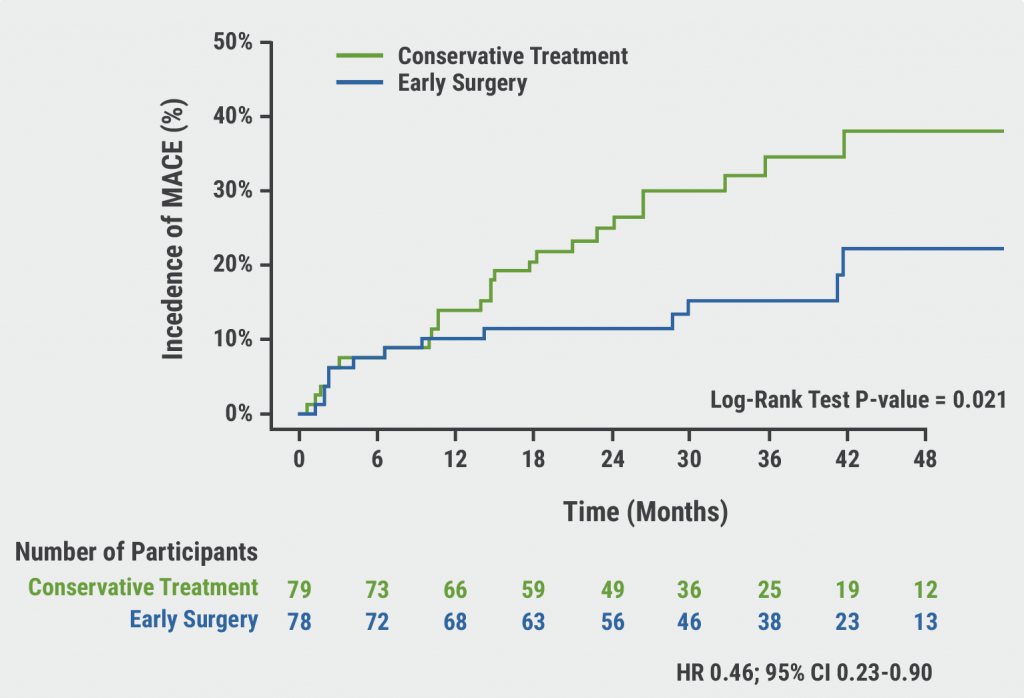The odds of death from any cause, stroke, myocardial infarction or repeat revascularization one year after treatment were 6.9% with bypass versus 10.6% with FFR PCI, giving PCI a hazard ratio that was 50% riskier.
When the research team, led by Dr. William Fearon of the Stanford University School of Medicine in California, excluded patients who underwent repeat revascularization, bypass (CABG) also produced a better outcome. Rates of the composite primary endpoint were 5.2% with bypass compared with 7.3% with FFR-guided PCI.
In contrast, the group found that the odds of major bleeding were 2.4 times higher, arrhythmia was nearly 6 times more likely, and acute kidney injury was 9 times more common in patients with three-vessel disease treated with bypass surgery.
Earlier studies have shown that bypass produces better outcomes, but it hasn't been clear if PCI can score as well as bypass when FFR is used.
The findings, from the FAME 3 study, were released Thursday at this year's Cardiovascular Research Foundation's Transcatheter Cardiovascular Therapeutics Conference and online by the New England Journal of Medicine.
Medtronic and Abbott Vascular financed the trial.
"Both FFR-guided PCI and CABG performed very well in patients with three-vessel coronary artery disease when compared with previous studies," Dr. Fearon told Reuters Health in an email. "In patients with less complex disease, FFR-guided PCI performs favorably compared with CABG, but in patients with very complex disease, CABG remains the preferred option."
He said the study offers good news for patients because "it provides more information about the pros and cons of PCI vs CABG in patients" with three-vessel disease.
"We have not known how contemporary PCI compares with CABG," said Dr. Fearon, professor of medicine and director of interventional cardiology at Stanford. "FAME 3 now tells us that."
Among Americans over age 60, 40% have some degree of narrowing in their heart arteries caused by the buildup of plaque. In 2009, Fearon and his colleagues reported that threading a sensor that measures blood pressure into the artery allows doctors to better place their stents to produce fewer complications and lower the risk of death, heart attack and the need for repeat revascularization.
In addition, updated results were needed because modern stents have narrower walls and slowly release drugs that prevent inflammation.
If a patient has plaque buildup that has calcified, the buildup is extensive throughout the blood vessel, the buildup is at a branching point, a blood vessel is completely blocked or numerous stents would be needed, "then bypass might be a better option," Dr. Fearon said.
"If they have less complex disease, they can feel reassured that by receiving the latest generation of drug-eluting stents guided by FFR, their outcomes would be just as good as they would be with surgery," he said.
The researcher said he was surprised that bypass patients did as well as they did in the study. That "may speak to improved operative techniques and better adherence to medical therapy," he said in his email.
CABG produced more side effects but "most of the side effects are short-lived," Dr. Fearon said.
Severe bleeding was seen in 1.6% of PCI patients versus 3.8% of those who received CABG. The respective rates were 0.1% and 0.9% for acute kidney injury, 2.4% vs 14.1% for atrial fibrillation or clinically significant arrhythmia, and 5.5% vs 10.2% for rehospitalization within 30 days.
SOURCE: https://bit.ly/2ZNPuFd The New England Journal of Medicine, online November 4, 2021.
By Gene Emery
Posted on
Previous Article
« Older HPV vaccine cuts cervical cancer rate up to 87%, study finds Next Article
Younger non-Hodgkin lymphoma survivors at higher risk for age-related diseases »
« Older HPV vaccine cuts cervical cancer rate up to 87%, study finds Next Article
Younger non-Hodgkin lymphoma survivors at higher risk for age-related diseases »
Related Articles

May 17, 2022
Distal radial access does not impair hand function
© 2024 Medicom Medical Publishers. All rights reserved. Terms and Conditions | Privacy Policy
HEAD OFFICE
Laarderhoogtweg 25
1101 EB Amsterdam
The Netherlands
T: +31 85 4012 560
E: publishers@medicom-publishers.com

